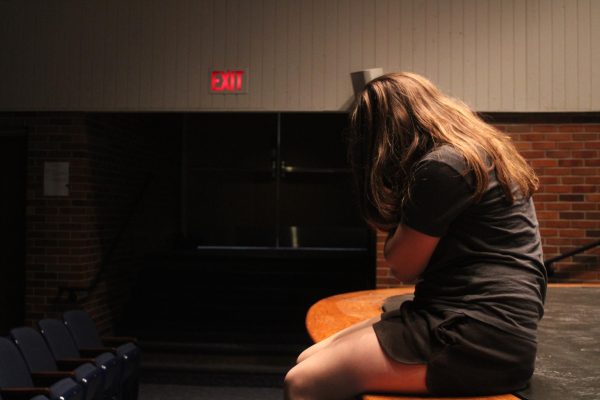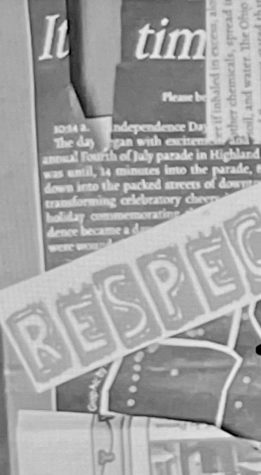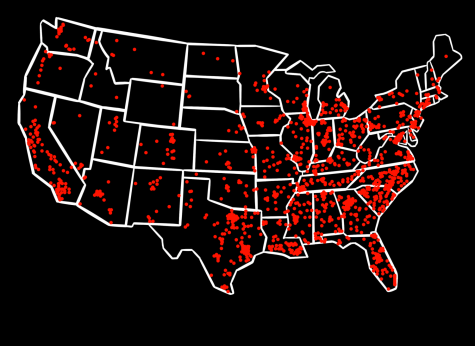Presidential election requires thoughtful discourse
March 11, 2016
With the presidential election season in full-swing and the Illinois primary on March 15, it is extremely common to see political commentaries on your newsfeeds and candidate signs posted in your neighbor’s lawns. During this time, it is easy to become complacent about your political views and disregard the differing opinions of opposing parties and candidates. However, it is equally important that all voters, including the majority of this graduating class, consider the viewpoints of all presidential candidates and news sources in order to cast the most educated vote possible.
Media outlets such as The Drudge Report and Fox News Channel are notably conservative conduits for political information, while The New York Times and MSNBC are pegged as the liberal equivalents. Whether students strongly side with one political party or straddle both groups, the Oracle Editorial Board, along with David Kane, AP Government teacher, emphasize the importance of considering both Democratic and GOP opinions before participating in political discourse and voting in the elections.
“If you only ever hear information from sides that only support your position, you can never question if that’s the right position,” Kane added. “It’s a hard skill to sit there and read something you don’t agree with, but it does make you think, ‘Am I infallible? Could I be wrong on this?’ If there’s only one right idea then we would have solved all of these problems.”
Kane also stresses the reality of the political paradox: although there are two parties campaigning against each other to acquire partial control of the American government, in the end, the two sections maintain the common goal of bettering our nation. This idea extends into the political discussions of students and adult voters alike; there is no one right or wrong answer when it comes to solving America’s issues. Rather, these solutions are implemented by way of collaboration and compromise, and political discourse must follow the same bipartisan pattern.
“The thing I stress to my kids is that, in your heart of hearts, do you truly believe, put in ‘blank,’ the opposite party wants America to do worse?” Kane said. “I don’t think many people think that if you’re a hardcore Republican or Democrat that you really want America to fail. Republicans think Democrats fail. Democrats think Republicans fail. We all think ‘How do you get to success?’ But that doesn’t make one person evil or bad or a bigot or a racist or a communist. Simply, you have a vision of how we can get to the goal, which is a better America for everyone, and the other [party] has a competing interest.”
Moreover, partaking in legislative discussions is a key strategy for broadening political opinions. It is crucial, though, that if students decide to contribute to these dialogues, they are going in with their self-formed beliefs and not just rehashing relevant media rhetoric. If students want to participate in these discussions but don’t know where to gather information from, websites such as The Skimm and BuzzFeed News break down political commentaries in a relatively understandable, although partially biased, format.
As far as our school is concerned, the Oracle Editorial Board suggests that South implements political focus groups–another opportunity for students to learn more about national issues and policies. These focus groups could be mediated by a qualified teacher and would be a way to encourage healthy discussions between students who have dissimilar beliefs. Similar to the already existing Politics Club, these focus groups would address one issue at a time and could be held during lunch blocks.
Junior Max Shapiro, founder of South’s newly formed Young Democrats club, feels that it is necessary to brings students into the world of politics in a conversational group setting. Even though Shapiro will be unable to vote in the upcoming election, he acknowledges the necessity to remain informed and maintain educated political opinions. That being said, Shapiro’s focus in the club is to spark a political interest in students so that they ultimately cast the best vote possible.
“One of the most important issues with young people is that there’s a low-voter turnout,” Shapiro started. “I think that this is because none of them are that interested in politics. Young Democrats Club offers an opportunity for young people, who either love politics or don’t know much about them, to get involved in politics and to help them make decisions about who to vote for.”
In addition, Clayton Nimz, senior class board member, believes that this form of face-to-face political engagement is a necessary replacement for the online alternative. With these focus groups, a mediator can encourage students to support their opinions if they lack proper evidence. This prevents students from hiding behind a computer screen where they can opt out of political discussions the second they feel intellectually overridden.
“I think [students posting their political opinion online] is very hurtful,” Nimz said. “[People think] that degrading [these candidates] by saying a funny one-liner seems harmless, but it ends up derailing what politics are all about.”
In dealing with the upcoming elections in March and November, the Oracle Editorial Board highly recommends that those who are eligible register to vote. Not only is voting a civic duty in accordance with our nation’s democracy, but, unlike past presidential primaries, Illinois has the potential to decide the presidential nominations for both parties. In the past, by the time the primary election occurred in Illinois, the nominees were already determined. More-or-less, your vote will matter.
Being a part of the nationally recognized debate program at South, senior Michael Callahan has acquired firsthand experience with political research and eventual discourse. As someone who is going to vote in the upcoming election, Callahan underlines the importance of being an active citizen in our nation’s democracy, because, ultimately, our votes do instigate government revisions.
“One of the themes that people in debate talk about is a term called ‘civic engagement,’ which is the idea that if people don’t participate in democracy or vote, then nothing changes whatsoever,” Callahan noted. “So even if you’re one person voting, it’s still important to do your part and participate in democracy, even though it’s not about that one, single vote.”
While those who will not be 18 by Nov. 8 are unable to vote in this particular election, the Oracle Editorial Board feels that students need to remain educated from a historical literacy standpoint and pay attention to the current political cycles. Callahan also acknowledges the necessity to be a politically-aware citizen, even if certain students are too young to vote.
“[Even if you aren’t voting], I think it’s important to understand how things have led up to the point that they are at [at the time of the next presidential election],” Callahan added. “For example, I wouldn’t know the legacy of Bush and Obama in terms of the 2008 financial crisis and the invasion of Iraq if I wasn’t up to date on politics, and that would affect how I see candidates today. So, even if you’re not able to vote in [this] next election, I think you should still stay up to date, because when you do become old enough to vote, the things that are important now will still be affecting the election then.”
According to the 2015 U.S. Census data, voter turnout in the United States is among the lowest in the developed world. Only 50 percent of people ages 18-29 are registered voters, according to an article in the Huffington Post. The statistics for South are similar; according to an Oracle-conducted survey of 128 eligible students, only 47 percent are registered. While this number is surprisingly low, the Oracle Editorial Board strongly suggests that South voters are represented as well as they can be at the poll booths. Because, according to the same article, young voters turned out in droves to help propel Barack Obama to the presidency in 2008. You have the potential to be the deciding factor in this election as well.











